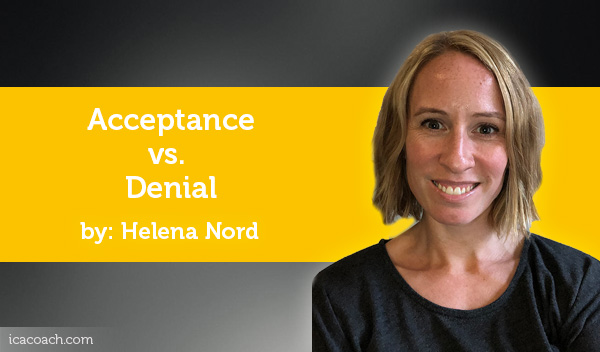
A Coaching Power Tool Created by Helena Nord
(Life Coach, DENMARK)
In my experience that which is often holding people back from achieving what they want, is that they have not accepted their circumstances or the position they are in. They have not accepted that there are things they cannot control, and they, therefore, keep working against the “waves” to try to create change. Some things are possible to change, and some things are not. When it is out of your control to change things then it is more helpful to let go rather than remain in denial as this prevent us from seeing alternative options. When we do not accept our current situation then we carry our baggage with us and keep living with the burden it gives us.
I chose this power tool because my personal experience with acceptance which was very powerful. Acceptance can give you peace of mind about things you are not able to change and give you a feeling of lightness. It will empower you to achieve greater awareness about what you can control and change.
What is acceptance?
Acceptance of one’s life has nothing to do with resignation; it does not mean running away from struggle. On the contrary, it means accepting it as it comes, with all the handicaps of heredity, of suffering, of psychological complexes and injustices. Paul Tournier (themindfulword.org)
Happiness can only exist in acceptance. George Orwell (themindfulword.org)
Acceptance is choosing to live your life with all the good and bad it brings and making the best of it. When accepting your life circumstances and all the things that are out of your control, you release positive energy towards changing what you can change and release all the negative energy built up trying to change what was out of your control. Before you can change something, you must accept.
What is denial?
The thing about denial is that it doesn’t feel like denial when it’s going on. Georgina Kleege (http://www.wiseoldsayings.com)
Denial is not being true to ourselves and our surroundings. It happens as a way of coping with a challenging situation or when we find it too hard to accept reality as it is. Denial creates a temporary solution and relief.
Denial is the lid on our emotional pressure cooker: the longer we leave it on, the more pressure we build up. Sooner or later, that pressure is bound to pop the lid, and we have an emotional crisis. Susan Forward
Being in denial does not bring forth sustainable solutions but keeps us in a state where we do not have the control or the ability to change our situation.
Denial does not solve the problem. Denial does not make the problem go away. Denial does not give us peace of mind, which is what we are really seeking when we engage in it. Denial is a liar. It compounds the problem because it keeps us from seeing a solution and taking action to resolve it. Bill Kortenbach
Coaching application
Themes in coaching around acceptance include accepting that some things are intimidating, accepting that you cannot change other people, accepting that you cannot get everybody to like you or like your ideas, accepting that you will not be successful with everything you do, accepting that you did not achieve your goal the first time you tried. Accepting that not everything will go our way in life, will open up the possibilities of living with less fear and more motivation towards living life at its fullest. Accepting limitations is also a way of gaining empowerment and creating new opportunities. Acceptance is a choice, those who choose acceptance will gain empowerment and disarm fear, doubt and worry and be more open to the possibilities of outcomes that are desired. Consciously choosing the power of acceptance enables and empowers you to go with, rather than against “the flow”
I have a client who struggles with physical issues arising out of 3 pregnancies. She is completely mobile but has damaged her body in a way that prevents her from certain psychical exercises that she used to do and had a passion for. She is aware of her body’s limitations, but she has still not accepted her limitations, so she continues to try to push her body with the result of pain both physically and emotionally when she is continuously confronted with her limitations. She is still living in denial of her body’s limitations and therefore she continues to be disappointed, frustrated and sad because of her situation. The lack of acceptance is keeping her from seeing alternative exercise options and getting the benefits of exercise and the empowerment of realizing that some things are still in her control to change and to do.
The first step towards change is awareness. The second step is acceptance. Nathaniel Brandon